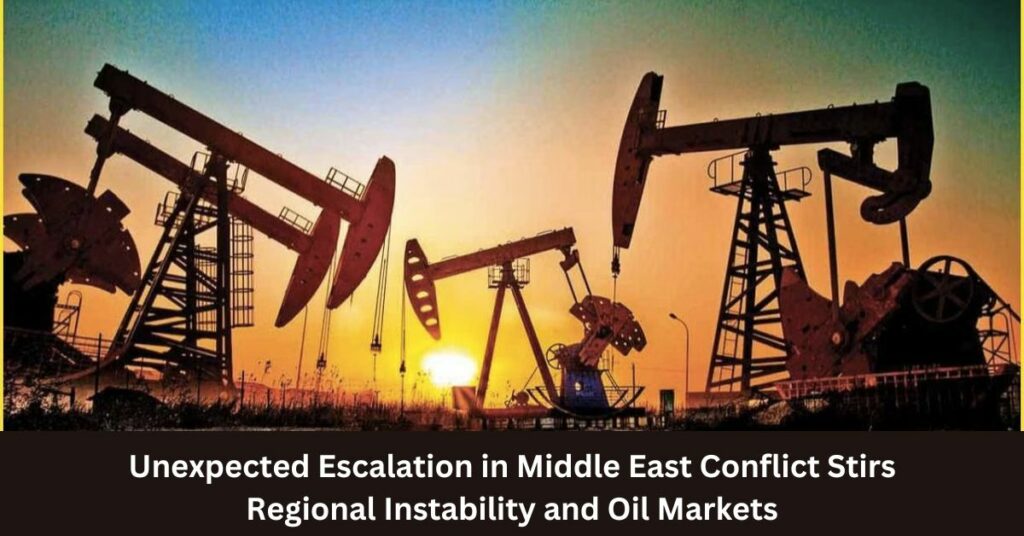Over the recent weekend, a sudden offensive by the Palestinian Islamist group Hamas against Israel marked a significant escalation in the ongoing conflict, the most severe in decades. The skirmishes have already claimed over 1,000 lives, stirring apprehensions that a possible expansion of hostilities might entangle Iran, thereby leading to supply disruptions. This tension was reflected in the oil markets with Brent and WTI indexes surging over four percent on the following Monday during early trading hours in Asia.
Implications on Oil Markets
Stephen Innes, the head of trading at Singapore-based SPI Asset Management, highlighted the Middle East’s violence as a glaring risk to oil markets, where any disruption in production or transit could adversely affect supplies. Notably, the Middle East accounts for nearly a third of the global oil supply. Historical data implies that geopolitical upheavals in this region often precede sustained hikes in oil prices.
🚨 Breaking: 🌍 Global Watch: Middle East Tensions & Energy Markets 🛢️
As tensions rise in the Middle East, the world braces for impacts on energy markets & geopolitical stability. Let’s unpack the implications & potential beneficiaries in the oil & gas sectors. 🌐🔍…
— WallStreetBulls (@w_thejazz) October 8, 2023
#IsraelWar and its impact on the world 🌍
👉 Amidst the chaos, oil traders have fixated their attention on Iran 🛢️🔍
💡The tension in the region has significant implications for global oil markets ? 📉⛽️ #IsraelWar #OilTraders #GlobalMarkets #MiddleEastTension pic.twitter.com/bhedUjYoQf
— Dividend Code (@DividendCode) October 8, 2023
Israel’s Response
Israel, devoid of crude production, faced thousands of rocket assaults from Gaza following the initial attack. To counter, Israel orchestrated a series of air strikes targeting the Gaza Strip, causing numerous casualties and the demolition of several multi-story structures. The strikes were primarily aimed at Hamas military installations, as reported by Israel’s emergency services.
Israeli airstrikes have targeted Hamas hideouts in Gaza moments ago. situation is tense & fluid, and there are reports of casualties.
What #Gaza has started, #Israel is finishing.
Repost if u agree!!#GazaUnderAttack #IsraelAtWar Israel-Palestine #HamasTerrorists#hamas… pic.twitter.com/lIP4x5TIv4— unblemish (@bhadrauli) October 9, 2023
International Concerns and Iran’s Involvement
Western nations have expressed condemnation towards the intensified conflict between Israel and Hamas. The focus also shifts to Iran, the globe’s leading crude exporter, following assertions of Tehran’s support for the assault. If substantiated by Western authorities, this involvement might trigger renewed endeavors to enforce sanctions on Iran’s oil sector more stringently.
Hostage Situation and Political Reactions
On Sunday, a senior Hamas official disclosed that the militant group had taken over 100 Israeli captives during the weekend onslaught, marking its most extensive attack on Israel from Gaza in years. Notably, the hostages included dual U.S.-Israeli citizens. The news prompted the House Republican leadership in Washington to urge the administration to bring the perpetrators to justice. Representative Steve Scalise, R-La., criticized the Biden Administration for its alleged appeasement towards Hamas terrorists and financial aid.
Given the sophistication of Hamas’s attack against Israel, Iran would have had a role, since Hamas doesn’t have the ability to buy weapons at this scale, a source told CNN.
Earlier, Israeli journalist @manniefabian released a compilation of Hamas clips which showed how it invaded… pic.twitter.com/i3PvGKJY4b— Iran International English (@IranIntl_En) October 9, 2023
Potential Saudi Arabian Output Increase
Apart from Iran’s involvement, the escalating situation in Gaza and its repercussions on regional stability might incentivize the Saudi Arabian government to escalate its output. Consequently, this could elevate the price of Brent crude, the international benchmark, which already hit $86 a barrel on Monday. Despite recent drops due to concerns over high interest rates and diminishing growth, the fresh surge in tensions has rejuvenated oil prices, mirroring the global apprehension over the escalating Middle East conflict.
The abrupt escalation in hostilities between Israel and Hamas has not only led to a tragic loss of life but has also cast a long shadow over the stability of the Middle East. The reverberations of this conflict are being felt far and wide, notably impacting the global oil markets and potentially the geopolitical landscape if Iran’s involvement is confirmed. The international community, along with regional stakeholders, is closely monitoring the unfolding scenario, awaiting resolutions to restore peace and stability in the tumultuous region.

